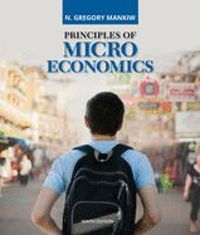Question
Question1 The ongoing COVID-19 pandemic has had a devastating human impact on our society. Without a doubt, it has also had an economic impact. Consider
Question1
The ongoing COVID-19 pandemic has had a devastating human impact on our society. Without a doubt, it has also had an economic impact. Consider the pandemic's impact in terms of bothmicroeconomicsandmacroeconomics. Think of twomicroeconomicchanges that have resulted from the pandemic and list them, briefly explaining what makes them microeconomic. Then think of twomacroeconomicchanges that have resulted from the pandemic and list them, briefly explaining what makes them macroeconomic. Now consider your own role as a decision maker (hint: this is microeconomics). Have you been impacted economically by the pandemic? Explain how or how not.
Question2
Our textbook argues that human wants are "virtually infinite." Do you as an individual have infinite wants? In other words, is there no limit to what you would buy/consume if you had all the money in the world? Briefly explain why you do, or do not, have infinite wants.
Question3
Our textbook says "For some goods, geography affects specialization. For example, it is easier to be a wheat farmer in North Dakota than in Florida, but easier to run a tourist hotel in Florida than in North Dakota." Now think about this in an international context, comparingCanadato theUnited States. For what types of activities do you thinkCanadahas an advantage over theUnited Statesin terms of "geographic specialization?" Name two.
Question4
a. In the circular flow model, if Erinpurchases a box of breakfast cerealat the grocery store, is Erin participating in the outer circle including arrows A and B, or the inner circle including arrows C and D (for your answer, just choose either "outer" or "inner")?
b. In the circular flow model, if Ford Motor Corporationgives an employer-provided health insurance benefitto from Tony in exchange for Tony's labor at the corporate headquarters, is Ford Motor Corporation participating in the outer circle including arrows A and B, or the inner circle including arrows C and D (for your answer, just choose either "outer" or "inner")?
Question5
When it comes to economic systems, does the United States operate closer to thecommand economyormarket economyend of the spectrum?
Question6
Residents of the town of Martysville like to consume canned peaches, but each can of peaches requires 20 people to produce it and takes a month. If the town has a total of 400 people andconsumption is limited by production, what is the maximum amount of cans of peaches that residents can consume per month?
Question7
a. On abudget constraintgraph, if a level of consumption relates to apoint directly on the budget constraint, can the consumer afford that point? (Just answer yes or no.)
b. On abudget constraintgraph, if a level of consumption relates to apoint outside the budget constraint, can the consumer afford that point? (Just answer yes or no.)
c. On abudget constraintgraph, if a level of consumption relates to apoint inside the budget constraint, can the consumer afford that point? (Just answer yes or no.)
Question8
Suppose you have $14 to spend on either bags of peanuts or bags of cashews. Peanuts cost $14 each and cashews cost $7 each. What is youropportunity costof buying a bag of peanuts?
Question9
Answer the questions based on the included table.
| Production Alternatives | |||||
| Type of Production | A | B | C | D | E |
| Crates | 0 | 10 | 20 | 30 | 40 |
| Barrels | 200 | 180 | 140 | 80 | 0 |
(Note, answers can be expressed as fractions.)If the economy starts at pointC, how many crates does it cost to produce one more barrel? How many barrels does it cost to produce one more crate? If the economy is producing 140 barrels and 10 crates, is it operating at "productive efficiency?"
Question10
Suppose you are considering buying an additional energy drink. You estimate that your marginal utility for purchasing the drink islower thanthe opportunity cost for purchasing it. As a "rational consumer.", and assuming the drink is within your budget, are you likely to purchase the soda? Why or why not?
Question11
Briefly describe your own original example ofthe law of increasing opportunity cost.
Question12
If country X can produce a good at a _____ opportunity cost than country Y, that means country X has a comparative advantage over country Y for that good.(Fill in the blank by choosing either "lower" or "higher.")
Question13
a. "Employment in the United States fell during the COVID-19 pandemic." This is a _____.(Fill in the blank by choosing either "positive statement" or "normative statement.")
b. (1 point) "The United States should offer more protections for the unemployed during the continued recovery from the pandemic." This is a _____.(Fill in the blank by choosing either "positive statement" or "normative statement.")
Question14
Matching: pair each description on the left with the correct answer on the right.Note: read carefully.
| a. A pointinsidethe PPF represents _____. | 1. productive efficiency |
| b. A pointoutsidethe PPF represents _____. | 2. unattainable production |
| c. A pointdirectly onthe PPF represents _____. | 3. economic growth or increasing technology |
| d. Ashift of the entirePPF represents _____. | 4. underproduction |
Step by Step Solution
There are 3 Steps involved in it
Step: 1

Get Instant Access to Expert-Tailored Solutions
See step-by-step solutions with expert insights and AI powered tools for academic success
Step: 2

Step: 3

Ace Your Homework with AI
Get the answers you need in no time with our AI-driven, step-by-step assistance
Get Started


